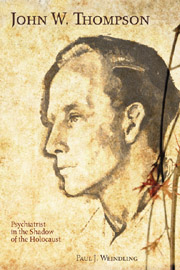Book contents
- Frontmatter
- Contents
- List of Illustrations
- Acknowledgments
- List of Abbreviations
- Part One Into the Dark
- Part Two Redemption
- Part Three Aftermath
- 13 UNESCO: At the Conscience of the World
- 14 The Eau Vive Affair
- 15 Sebastian
- 16 Matthias
- 17 Child Guide
- 18 New York: “St. John the Psychiatrist”
- 19 Hallucinations
- 20 “Dying We Live”
- Appendix John Thompson's Writings
- Notes
- Sources
- Index
19 - Hallucinations
from Part Three - Aftermath
Published online by Cambridge University Press: 12 September 2012
- Frontmatter
- Contents
- List of Illustrations
- Acknowledgments
- List of Abbreviations
- Part One Into the Dark
- Part Two Redemption
- Part Three Aftermath
- 13 UNESCO: At the Conscience of the World
- 14 The Eau Vive Affair
- 15 Sebastian
- 16 Matthias
- 17 Child Guide
- 18 New York: “St. John the Psychiatrist”
- 19 Hallucinations
- 20 “Dying We Live”
- Appendix John Thompson's Writings
- Notes
- Sources
- Index
Summary
A Divided Self
Eau Vive haunted Thompson as a therapeutic paradise lost, a place where humanity's fractured, broken state could be restored to wholeness. In the camp of the Living Water and the living, spoken word, words were tested “by listening to the voice of their previous perversion.” Thompson told the Einstein psychiatrist Stephen Bauer how one antisocial member at Eau Vive imagined he heard a message “from Dr. Thompson” ordering them to disband. Thompson returned to find the place deserted. The auditory hallucination concluded his stylized parable of survival, community, and delusion.
Thompson got to hear of the new radical psychiatry of R. D. Laing's Divided Self. Joseph Berke asked, “John, why don't you put your thoughts onto paper as Laing has done?” Thompson explained that writing was a sacred occasion, reserved for poetry. In the death camps, “the written, fixed word was used as a substitute for the spoken word,” for a perverted use of words made human encounter impossible. What mattered to Thompson was person-to-person communication. Berke went to Edinburgh for clinical training with Maxwell Jones. Berke arranged Laing's visit to New York in 1964. Laing spoke on interpersonal violence on the public radio station WBAI. Berke introduced Laing to Thompson. Laing conceded that Thompson was the only person who knew more about schizophrenia than himself. Both were interested in the spiritual, Laing through Sartre's existentialism and the mysticism of Krishna.
- Type
- Chapter
- Information
- John W. ThompsonPsychiatrist in the Shadow of the Holocaust, pp. 301 - 320Publisher: Boydell & BrewerPrint publication year: 2010



